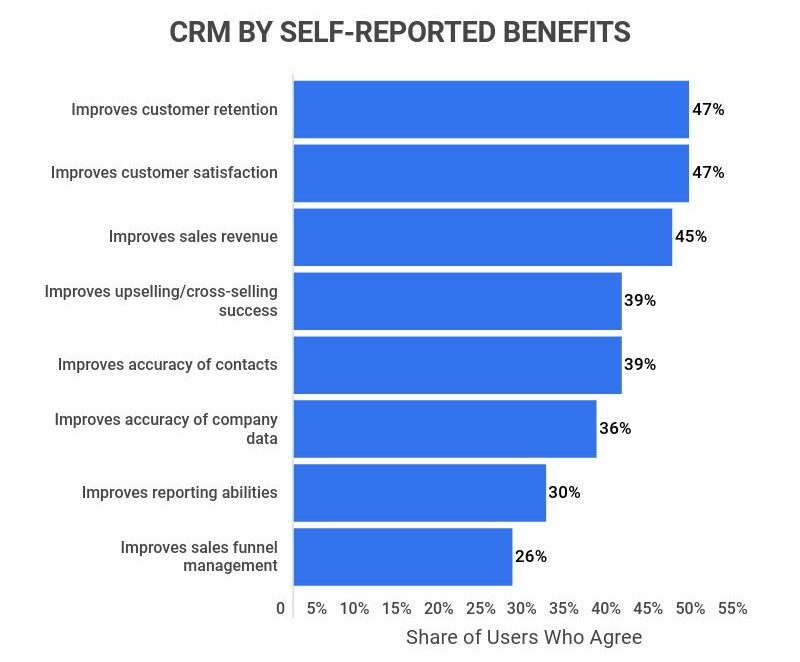Gone are the days when professionals relied solely on traditional methods to close deals in sales. A new era has dawned, where innovative technology empowers sales teams to navigate the complex terrain of modern commerce with unprecedented precision and efficiency. With modern tech, forward-thinking companies are reaping the benefits of enhanced productivity, accelerated sales cycles, and deeper customer engagement.
However, it can sometimes be confusing where to start if you want to adopt some breakthrough software solutions to improve the effectiveness of your sales team. Suppose you’re still doing business old-school, relying on paper workflow. In that case, the first step towards modern standards should probably be adopting a digital document management system. But where to invest if you already know how to do business with modern CRM systems? Today, we’ll consider some important tech trends that will help you improve the management of sales operations in 2023 and beyond.
Focusing on the Things You Really Need
Before embarking on a tech investment journey, conducting a thorough assessment of the sales department’s needs is essential. What pain points exist? Are there specific areas where inefficiencies persist? Engaging with sales representatives and key stakeholders is crucial to identify pain points and to understand their daily challenges. This process will lay the groundwork for identifying the right technologies that address these pain points and yield measurable improvements.
Next, it’s essential to establish clear objectives that align with the company’s overall sales strategy. Are you aiming to increase lead generation, improve sales conversions, or enhance customer engagement? By setting concrete goals, decision-makers can narrow down their technology choices to those that directly support these objectives. For instance, investing in a robust CRM system with advanced lead-scoring capabilities may be ideal for a company that generates high-quality leads.
Staying informed about the latest technology trends is essential to making informed investment decisions. Industry-specific conferences, thought leadership articles and analyst reports provide valuable insights into emerging technologies that have demonstrated tangible benefits for sales teams. Chatbots for personalized customer interactions or predictive analytics for sales forecasting are just a few examples of innovations transforming the sales landscape. By keeping abreast of these trends, companies can identify technologies that have proven track records and hold the potential to deliver significant returns on investment.
If you can’t match your current needs with specific technologies to outline how a suitable software solution can look, have no fear. A custom software developer’s business analyst can navigate you through the world of the most current technologies to find the best possible solution to your challenges.
Where to Invest to Improve Your Sales Operations
More Comprehensive CRM Platforms
Let’s start with something no sales team can live without if satisfied customers are one of their priorities. We, of course, speak of CRM systems. As statistics gathered by Zippia show, 91% of companies with 10 or more employees use a CRM software solution. The benefits of adopting such a system are pretty evident. These indicators from the same report speak for themselves:

The question is how to upgrade your current sales team’s CRM to correspond to modern standards. Advanced automation capabilities are crucial here, enabling streamlined processes and reducing manual effort.
Read Also Top List of Signs that Your Legacy Software Needs Modernization
Modern CRM must include machine learning functionalities, empowering users with predictive analytics, personalized recommendations, and intelligent lead scoring. Integration with various communication channels and platforms, such as email, social media, and messaging apps, is imperative for comprehensive customer engagement.
CRM systems can become powerful lead generation tools that streamline the process of acquiring potential customers. A streamlined approach simplifies lead acquisition, ensuring a consistent flow of potential customers for sales teams to engage with. The process also encompasses efficient lead qualification. CRM systems can implement lead scoring mechanisms based on predefined criteria, enabling sales teams to prioritize leads based on their potential value. Lead nurturing capabilities help cultivate relationships with leads at various stages of the sales funnel.

Source: Handy Custom CRM Software
Email marketing integration within CRM systems enables businesses to deliver highly personalized communication. By leveraging customer data stored in the CRM platform, you can tailor emails based on individual preferences, behaviors, and purchase history. Moreover, you can automate your marketing campaigns by setting up automated workflows triggered by specific customer actions or events, such as abandoned carts or completed purchases. Automated campaigns ensure timely and relevant communication, reducing manual effort and enabling businesses to nurture leads efficiently.
Wider AI Adoption
Advanced analytics that modern CRM systems provide already have a pinch of AI in them. Predictive analytics implies that the software you use learns the information you have to make data-based predictions. This technology, however, is broader than this particular application and may take various forms.
Probably, you’ve already heard of ChatGPT and all the prospects its adoption promises in sales and other spheres. The AI market size growth, according to Statista, will resemble a blooming garden in the upcoming years:

Therefore, you may start thinking of making AI software development a part of your business strategy. Let’s consider some examples of using this technology for your sales department.
Chatbots. Unlike your sales team members, chatbots are accessible by customers 24/7 so that the gears of business turn day and night. By leveraging AI algorithms, they analyze customer data and deliver personalized recommendations and offers. It deepens customer engagement, builds trust, and increases conversion rates. Chatbots proactively engage website visitors, collecting information and qualifying leads. This automation frees up sales teams’ time and enables them to focus on high-potential leads, streamlining the sales process. The best part is that they don’t stop learning. Each interaction with a new customer helps improve conversational abilities. This adaptability ensures chatbots deliver increasingly sophisticated and personalized experiences.
AI-driven contact centers take a step further, providing more than imitating conversations between customers and sales specialists. They can be integrated with your already existing CRM system and work with all kinds of contact information to reach customers efficiently. By intelligently matching customer needs and representative expertise, these solutions ensure that each interaction with a customer is handled by the most suitable sales agent, maximizing the chances of a successful outcome.
Speech recognition and analytics. Modern AI not only speaks but also listens. Speech recognition technology allows businesses to transcribe and analyze customer calls with remarkable accuracy. By converting spoken words into written text, sales teams can gain a deeper understanding of customer preferences, pain points, and buying behaviors. By examining key metrics such as call duration, talk-to-listen ratio, and customer sentiment, sales teams can identify areas for improvement and provide targeted coaching. By analyzing conversations on the fly, these tools can offer prompts, suggest relevant talking points, and provide instant feedback, empowering sales specialists to navigate conversations with confidence and deliver a compelling sales pitch.
Effective Data Management and Business Intelligence Solutions
Your sales department operates tons of other data daily, and you must remember that it’s your strategic asset. Efficient data management practices enable businesses to collect and organize customer information, sales metrics, and market trends. With a centralized and integrated data management system, sales teams can access a unified view of customer interactions, track performance, and identify growth opportunities.
Business intelligence tools and advanced analytics technology enable businesses to extract actionable insights from complex datasets. Through data visualization, dashboards, and reporting capabilities, sales teams gain real-time visibility into key performance indicators, customer behaviors, and market trends. Predictive analytics models empower businesses to forecast sales outcomes, identify high-value leads, and personalize customer experiences.
Businesses can gain deep insights into individual preferences and buying patterns by analyzing customer data. This information empowers sales teams to tailor their approach, craft targeted messaging, and offer relevant products or solutions.
Read Also The Future of Business Intelligence (BI) and How You Can Keep Up with the Pace of Changes
Revenue forecasting uses data-driven predictive analytics to analyze historical data, market trends, and customer behavior. It helps generate accurate revenue projections, empowering companies to make informed strategic decisions. Here, a data-driven approach provides a solid foundation for planning and optimizing resources to drive growth. This feature helps identify potential risks, capitalize on growth opportunities, and allocate resources accordingly
Mobile Friendliness
Since there are more than five billion mobile users worldwide and, as statistics show, more than half of them are less likely to purchase after facing a negative mobile experience, mobile development must not be overlooked. Mobile-optimized websites, responsive designs, and intuitive mobile applications enable businesses to provide seamless browsing, effortless navigation, and intuitive user experiences. This accessibility fosters customer engagement, increases conversions, and amplifies sales opportunities.
Read Also Don’t Know How to Make Your Software Eye-Catching? This Is What You Can Use
The flexibility of mobile devices enhances customer satisfaction, improves sales cycle efficiency, and nurtures customer loyalty. Mobile-friendliness plays a vital role in delivering a seamless omnichannel experience. Businesses must ensure consistency and continuity as customers transition between devices and touchpoints. Also, mobile-friendly sales experiences extend beyond browsing and engagement to the payment process. By embracing mobile payment solutions and integrating with digital wallets, businesses offer customers a quick and secure way to complete transactions.
Conclusions
In a manner, the sales industry nowadays is a technology crossroads. Here, there’s nothing better for business than a good old conversation with a customer. Sometimes, however, complex AI can take care of this task instead of a human being, and nobody will notice any difference. CRM systems, a well-established classic in the sales industry, can reach a new level of efficiency with the addition of some machine learning algorithms.
There are different ways to ensure that you’re on the same page with the rest of the world in terms of technology in use. You can either constantly keep abreast of modern tech or cooperate with people who do it for you. Contact us if you want to enhance the efficiency of your sales department with solutions worthy of their place in 2023.